#paul shapiro
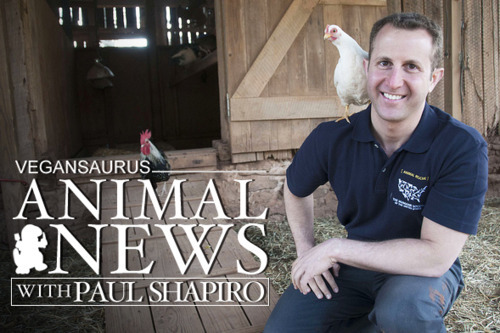
Did you know there’s a real-life vegan mafia? CNBC’s got the story about how one group of investors is seeking to give farm animals a hand. And some major meat companies are now in talks about licensing clean meat technologies (growing real meat without the animals), which could have dramatically positive outcomes for animals.
Sometimes the war on wildlife halts a bit, as happened this week when British Columbia announced a ban on trophy hunting of grizzly bears.
Animals in the wild may be getting somewhat of a reprieve, and animals in captivity are also getting some relief, with more and more cities and states banning the use of wildlife in circuses. This week Illinois became the first state to outright ban the use of elephants in circuses. If you want to help enact an ordinance in your city to protect wildlife from circuses, get HSUS’s new toolkit here!
Paul Shapiro
Vice President of Policy Engagement
The Humane Society of the United States
Follow at http://twitter.com/PaulHShapiro
P.S.Video of the week: I feel the same way about watermelon as these piglets.
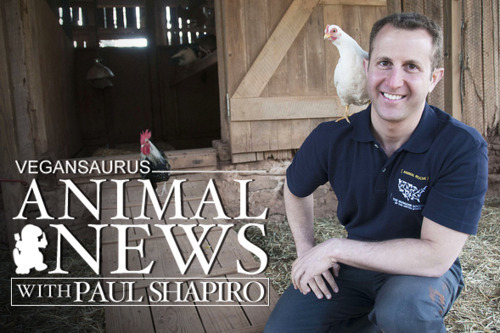
Could one chicken’s feather help supply literally tons of meat for the world, with that chicken living to tell the tale? That’s what Hampton Creek is suggesting in this new video about its newly-revealed work on clean meat. (And if you’ve been following the company, this new BuzzFeed story about the attacks it’s enduring may not surprise you.)
In the meantime, battery cages keep emptying, with one of the nation’s largest food service providers announcing an update this week that it will soon be 70 percent cage-free with its US egg purchasing.
There’s big news for companion animals too, with Cambridge, MA this week passing what may be the strongest pet store law in the nation, banning the sale of commercially bred dogs, cats, birds, reptiles, amphibians, hamsters, gerbils, arachnids, and more.
And finally, lest you think advancements for animals are limited to the US, the Czech Republic just banned all fur farming!
Have a great weekend,
Paul
Paul Shapiro
Vice President of Policy Engagement
The Humane Society of the United States
Follow at http://twitter.com/PaulHShapiro
P.S.Video of the week: When “sheepish” doesn’t seem to apply.

Did you know that NASA admirably has an Office of Planetary Protection whose aim is to ensure that our rovers don’t harm potential alien life on other celestial bodies? In a newAstronomy Magazinepiece, I ask the question of why we seem less concerned about harming life on our own planet. (Exhibit A: The federal government’s relentless war on wildlife. Exhibit B: HSUS’ new undercover investigation revealing pet store abuses in NYC.)
Here on Earth, for all the talk about peak oil, many experts are now asking if the world’s reached peak meat. One promising solution to this problem? Rather than raising and slaughtering whole animals, we may start growing real meat without the animals, as The Guardianreports this week.
For those chickens who will be used for food, NPR reports that one of the biggest poultry giants is beginning to implement the reforms advocated by animal welfare groups.
And in some final feel-good news: A dog meat farmer in South Korea asked Humane Society International (HSUS’ global arm) to help him shut down his operation and convert to crop growing. The photos and videos from The Daily Mail are quite inspirational.
Have a wonderful weekend!
Paul Shapiro
Vice President of Policy Engagement
The Humane Society of the United States
Follow at http://twitter.com/PaulHShapiro
P.S.Video of the week: Putting the “aw” in “yawn.”
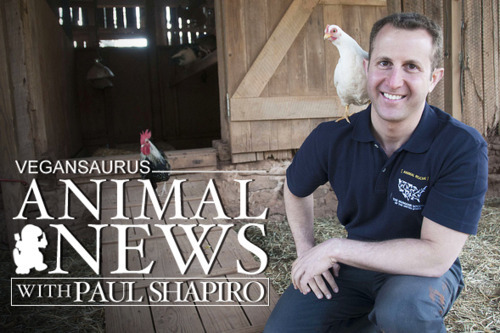
There was big news for bears in Vietnam, with a momentous agreement to end the hideous bear bile farms so notorious for their cruelty.
In the US, there’s progress for bears and other wild animals too, as the era of circus exploitation of wildlife continues closing. Maryland’s largest county held a very successful hearing this week on a bill to do just that.
There was progress for horses in the US too, with a key Senate vote that makes the reopening of horse slaughter plants less likely.
One of the best things any individual can do for wildlife and farm animals is simply to eat less meat, a point made by HSUS’ Matt Prescott in a FORTUNE feature this week. And for the chickens who are going to be used for food, they may suffer less thanks to progress announced this week by America’s fourth largest chicken producer after it worked with animal protection groups, HSUS included.
Finally, some in the animal ag industry are seething over the animal movement’s success in recent years. A former Tyson Foods executive lamented our progress this week, with the article comparing our effectiveness to the NRA’s, noting: “For part of the time, the activists were not tremendously successful. That has since changed, as their desires to get cages out of egg production and gestation crates out of pork production are becoming realities.”
Paul Shapiro
Vice President of Policy Engagement
The Humane Society of the United States
Follow at http://twitter.com/PaulHShapiro
P.S.Video of the week: A truly amazing look at how a slug eats in what may feel like real-time to them.
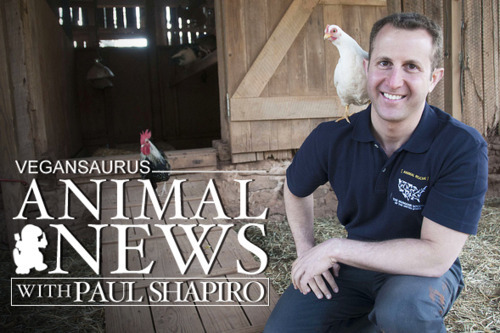
Do you think beef consumption is “vital to the public health and welfare”? Do you want the government reminding the public about “the essentiality of beef and beef products in proper human nutrition and to the maintenance of a high level of public health”? California lawmakers are considering a bill (which already passed the state Assembly and is now in the state Senate) that’d be a big handout to the beef lobby, including those findings and creating a California Beef Commission with all types of powers. Live in California? Take action now!
The good news is that California is also considering whether to ban pet stores from offering dogs unless they’re from animal shelters or rescue groups. TheLA Times editorial board weighs in this week on the issue, endorsing the bill.
Finally, do you wish you could show your friends and family in-person what a puppy mill or factory farm looks like? Animal groups, HSUS included, want to bring those places of abuse to your friends, virtually speaking. The New York Times has the story.
Paul Shapiro
Vice President of Policy Engagement
The Humane Society of the United States
Follow at http://twitter.com/PaulHShapiro
P.S.Video of the week: One Buddhist monk’s plea for animals—very worth watching!
P.P.S. Okay, yes, it’s true: Haagen Dazs is joining Ben & Jerry’s and Breyer’s and now offering its own line of dairy-free ice cream!
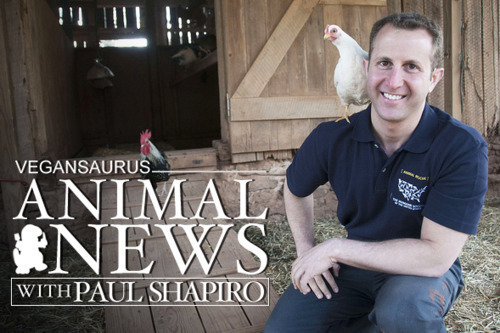
The race to commercialize clean meat (real meat, without the slaughter), just got more crowded withHampton Creek announcing its plans to disrupt the meat industry. As fellow cellular ag companyMemphis Meats observes this week: “The world is ready for clean meat.”
And it’s an industry in desperate need of disruption, as HSUS’s newly-released chicken farm and slaughter investigationdemonstrates.
I wish the cruelty we found in the poultry industry were fictional, but in the realm of fiction mirroring reality, Netflix released a new film this week, Okja, which the New York Times calls “a clear and effective animal rights fable.” Here’s my review of it.
Finally, in more good news: Pennsylvania’s Governor Tom Wolf gave the state’s animal cruelty laws amajor and multifaceted upgrade this week and made history at the bill signing by having the puppy mill survivor after whom the law is named (Libre’s Law) both at the signing and even having his inked paw “sign” the legislation next to the governor’s signature.
Video of the week: Are there any better moms than opossum moms?
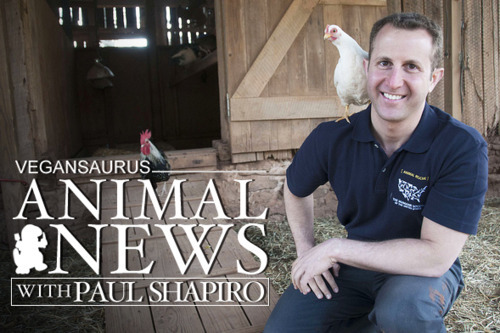
History was made in New York City this week, where the city council of America’s largest city voted overwhelmingly (43-6) to ban the use of wild animals in circuses. The mayor says he’s looking forward to signing the bill, which will finalize one of the most decisive blows to the dying industry of wild animal performances.
Such social progress is never easy, and sometimes it can go backwards. That was the case this week when the Trump administration removed federal protections for grizzly bears, one of the most maligned and persecuted animals in American history.
While those in political power are taking harmful actions like this one, some in financial power are using their influence to help the most vulnerable and abused animals, as the Financial Times points out this week in its profile of investing titan Jeremy Coller’s work to end factory farming.
Finally, some words of wisdom for animal advocates from my colleague Michelle Cho this week. In a new profile on her work, she reminds us: “The best, most effective way to incite conversation with people who just might be the animals’ best allies is through kindness and an inherent willingness to reach across the aisle to those whose path or lifestyle may be vastly different from yours, but whose hearts for animals beat just the same.”
Paul Shapiro
Vice President of Policy Engagement
The Humane Society of the United States
Follow at http://twitter.com/PaulHShapiro
P.S.Video of the week: Baby elephant wipes out while chasing birds; runs to mom.

Take it away, Paul Shapiro:
Big news in Rhode Island yesterday, where the House of Representatives voted overwhelmingly to ban battery cages for chickens.
Just a little further south of the Ocean State, in NYC this week, a bill to ban circuses from using wild animals passed out of its committee and is expected to get a full council vote shortly. As well, the New York state legislature just passed a bill banning the use of elephants in circuses. Animal-based circuses, the bell tolls for thee.
If you thought the bell had already long-tolled for legal bestiality in America, sadly you’ll have to think think again. Thankfully, Vermont just passed a law making such abuse of animals a crime, and Texas this week also made it a felony.
In the realm of things you can’t believe still happen, as you know, some people view dogs as food. What happens when a vegan and a guy who’s eaten dog meat chat about animal ethics? Find out in this new podcast interview of mine on We the People Live.
Finally, if you’re looking for a fun way to spend an hour this weekend, check out this truly poignant BBC comedy mockumentary about a future world where animals aren’t used as commodities: Carnage. (It’s free to view, and here’s a review of it.)
Video of the Week: I could watch this minute-long peaceable kingdom video all day!

Do you wish Zoe Barnes would return to House of Cards? Well, she’s returned to Washington at least, but not to haunt President Underwood. Instead, actress Kate Mara is haunting the USDA by demanding it stop covering up animal abuse data.
This comes at a time when a greater number of Americans are concerned about animal welfare. In fact, a new meat industry survey finds that nearly two-thirds of Americans think the treatment of farm animals “should be a societal concern and a regulatory issue.”
Speaking of regulation, if you agree with Republican Rep. Martha McSally that “no animal should suffer for a tube of lipstick,” you’ll want to urge your representative to sign on to the bill she introduced in the Congress this week to ban the sale of cosmetics tested on animals.
Just as new technologies have rendered such animal experimentation obsolete, the nascent field of cellular agriculture is hoping to do the same with factory farming. Just how will clean meat get commercialized? The roadmap to slaughter-free real meat is now laid out, and one Saudi Prince wants to help make it happen.
Paul Shapiro
Vice President of Policy Engagement
The Humane Society of the United States
Follow at http://twitter.com/PaulHShapiro
P.S.Video of the week: Does your cat like to go outside? Might be time to build a catio!

Another week, another loss for those fighting state laws protecting farm animals. This week the Supreme Court of the US declined to hear a case brought by opponents of California’s egg sales law, leaving the landmark protection for laying hens in place. With their total lack of success in the courts on this issue, the ag lobby is now gearing up for a new congressional effort to invalidate such laws.
While there’s also a bill in the Congress that proposes banning circuses from using wild animals, the most action is at the local level. In New York City, as of this week, a supermajority of city councilmembers is now signed on to a bill to ban wild animals in circuses. Between the recent Los Angeles vote on the issue and NYC’s upcoming vote, things aren’t looking good for those who want to keep exploiting animals for human amusement.
Have you ever wondered what monkey experimentation and animal ag have in common? If not, here’s your chance to know. I share some thoughts on the topic in a new Huffington Post opinion piece today.
Finally, are you mad as covfefe about what’s happening with climate change? Don’t boo; eat! We can each do something about it at our next meal, as this 10-year-old TEDx speaker reminds us.
Paul Shapiro
Vice President of Policy Engagement
The Humane Society of the United States
Follow at http://twitter.com/PaulHShapiro
P.S.Video of the week: And to think some people pay for mud treatments at spas.
Paul Shapiro, the Vice President of Policy Engagement for The Humane Society of the United States is here with all the animal news of the week! Yay Paul!
It’s the end of an era, or really, an error. This upcoming Sunday, after 146 years of exploiting animals for human amusement, Ringling Bros. will perform one final time and then close its infamous show for good. As historic and welcome as the event is, the fight is far from over, as there are still smaller circuses abusing wild animals in this US, as evidenced by HSUS’s new undercover exposé released this week showing what circus tiger training entails. (Hint: It’s a lot of whipping.)
In other good news, more people are concluding that cow’s milk is the perfect food (for baby calves) and are switching to plant-based milks, as NPR reports this week. There’s a lot going on in the business world to create such alternatives to animal agriculture, and one such hub of innovation is in the Middle East, where Israel is quickly becoming the Mecca for the clean meat movement.
Finally, if you’ve ever wondered whether animal advocates want a social club or a social movement, I discuss this (and more) in a new interview with Stanford’s Generation Anthropocene.
And finally, Video of the week: I love a good boot camp, but probably not as much as this dog.
Have a great weekend; hope to see you at the Reducetarian Summit in NYC!
Post link
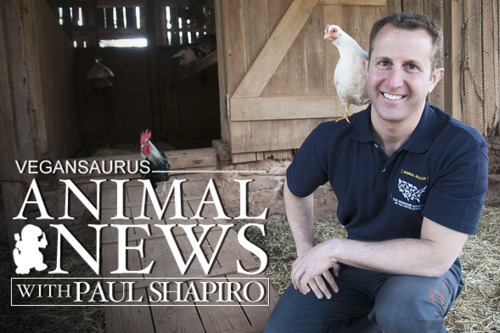
More and more nations around the world are recognizing that wild animals shouldn’t be exploited simply to amuse us. Just last week France banned captive breeding of orcas and dolphins, while the Baltic nation of Latvia voted to ban the use of wild animals in circuses.
In the US, the plant-based movement continues to gain steam, with the Los Angeles school board unanimously voting last week to pilot a vegan meals plan for students in the city. The San Francisco Chroniclereviewed two great new books on meat reduction, while one California healthcare system, after working with HSUS, is now implementing a plan to make 60% of all its food vegan.
Such pressure to move away from meat and toward plants is in part being driven by mega-investors and of course also in part by undercover exposés like this new dairy investigation by Compassion Over Killing. Perhaps these are some of the reasons Global Meat News reports this week that “pressure from all angles to cut meat consumption for health or environmental reasons had the single biggest impact on the industry last year.”
And if you needed any more evidence that the animal movement made major advances last week, in conjunction with HSUS, apparel giant VF Corp (owner of Timberland, Northface, and more) announced it will no longer use any fur in its products!
May progress beget more progress,
Paul
P.S.Video of the week: If only we could all get along like these rats and their favorite cat.

Well friend, the world’s first book on clean meat (growing real meat without animals) came out today! You can (and should…) order now.
If you want a taste (ha) of why so many people are talking about clean meat these days, I published an op-ed in Canada’s Globe and Mail this past week on the topic, and other coverage of the book has been good so far, too. And The Good Food Institute just ran a fun interview on it that you should check out.
Will clean meat help humanity expand its moral concern to include other animals? That’s an argument made by the Sentience Institute in this great profile VICE published on them.
BTW, speaking of other animals, have you ever wondered what chickens think about us? New research reported in The Onion sheds light on the topic. :-)
Have a great new year,
Paul
P.S.Video of the week: I love all interspecies friendship videos, but this one really s(n)ails above the rest…

If you haven’t heard of clean meat, now’s the time to stop living under a rock and start reading up on the topic on a lot of vegans’ minds these days. If you have heard of clean meat, now’s also the time to learn more about this breakthrough that could start CLOSING SLAUGHTERHOUSES DOORS FOR GOOD. Which is the goal, OK? Because, seriously, those places gotta go.
We were lucky enough to sit down with author and animal advocate Paul Shapiro (yes, the famed Paul Shapiro of Animal News You Can Use!) to break it all down. Paul’s new book Clean Meat: How Growing Meat without Animals Will Revolutionize Dinner and the World, comes out January 2 on Simon & Schuster’s Gallery Books, WHICH IS TOMORROW! Go get it!
Paul, congrats on writing the book on clean meat!
PS: Thanks! I guess it’s true I’ve written the book on it, since I’ve written the only book on it! Not the highest bar, admittedly, but there are others working on books on the topic too, and I can’t wait to read theirs.
Ha, fair enough. But yours is still the best-selling one out right now…
Good point!
So for the totally ignorant, I mean, for the less familiar, can you tell us just what this clean meat is?
We’re talking here about real meat, just grown outside animals. Not an alternative to meat, like Gardein or Tofurky, both of which I love. But real, actual animal meat, grown from animal cells as opposed to animal slaughter. Yes, it may sound like science fiction, but it’s now science fact. The book chronicles the pioneering startups and their investors racing to commercialize these animal-free animal products and the potential such commercialization has to address many of the most pressing sustainability concerns we face.
It’s called clean meat because, like clean energy, it’s so much cleaner for the planet. But it’s also just literally cleaner.
What do you mean the meat is literally cleaner?
Well, right now meat from animals is typically riddled with feces: E Coli, Campylobacter, Salmonella, all of which are intestinal pathogens. That’s why you have to cook the crap out of raw meat—literally—to prevent it from sickening you. But when growing clean meat, you don’t grow intestines; you just grow muscle, meaning it’s much cleaner and safer from a food safety perspective.
Cook the crap out of meat—literally. OMG. I get it: it’s cleaner. But it’s still animal meat. Should vegans eat this?
Well, clean meat’s not commercially available just yet, but that will change within a matter of years, not decades. And in many ways it doesn’t really matter if vegans eat it. The goal is for clean meat to displace factory farmed meat, not to displace plant-based foods, of course. It’s an alternative for people who feel like they’re wedded to eating real meat.
Why can’t those people just eat plant-based meats?
I hope they will and expect the plant-based protein sector to explode in the way the plant-based milk sector has exploded in recent years. But even with the popularity of plant-based milks, 90-percent of fluid milk sold in the US is still coming from cows. In the case of meat, more than 99 percent meat sold
in the US still comes from animals. (Plant-based meats are less than 1 percent of meal sales.) To the extent that many people want actual animal meat, clean meat is a way to provide it while causing much less cruelty, fewer greenhouse gas emissions, and with fewer resources.
That all sounds great, but will people actually eat clean meat?
Well, look at the meat people eat now. It comes from animals who were raised in the most unnatural and inhumane conditions imaginable. Sure, there may be some people who’ll say they refuse to eat meat unless an animal was slaughtered for it, but I suspect a lot of people will be quite glad to be
able to enjoy real meat with so many fewer downsides. And consumer surveys suggest that quite a lot of Americans would be happy to eat clean meat, too.
But will clean meat have the same unhealthy aspects of meat, like increased heart disease risk?
The nutritional quality of clean meat will likely be the same as conventional meat, but again, with food safety improvements. Theoretically that could be improved upon, but it’s likely that at least at first, it will just be nutritionally equivalent. All that said, I’m friends with a lot of vegans on social media, and
my feed is generally populated by celebratory messages about the latest vegan donuts, pizzas, ice creams, and other foods that are delicious but certainly unhealthy, so I don’t know what percentage of vegans are so concerned about health that they don’t occasionally eat unhealthy foods. Still, the goal
isn’t for vegans to eat clean meat, but vegans concerned about animals and the planet certainly should be enthused about the prospect of commercially viable clean meat so that many who do eat clean meat can switch.
GOT IT. So where can people learn more about the book?
PS: Check out www.CleanMeat.com, get the book, and tell me what you think about it!
You heard Paul Shapiro! Now leave our site and go buy the book! (Don’t worry, you can come right back afterwards!)

The cultural revolution for animals keeps moving forward. From my home of Montgomery County, MarylandtoScotland, more and more governments keep banning circuses from exploiting wildlife. Also, Michael Kors became the latest big fashion brand to swear off animal fur. And that was just this week! For a fuller rundown of awesome things that happened for animals in 2017, check out Wayne Pacelle’s list.
With so much progress, there’s always pushback from those who want to keep abusing animals. Fortunately, the LA Times editorial board this week called out the most dangerous threat animals face in the Congress right now. Want to help defeat this danger? Here’s your chance!
While animals always face threats, the factory farming industry is also at threat from Silicon Valley’s interest in disrupting the meat industry, as Fortune reports this week. And I published a piece in Scientific American this week on that too.
Video of the week: Pit bulls + balloons. Need more?
Paul Shapiro, Vice President of Policy Engagement, The Humane Society of the United States

There were once 50 million bison roaming in the United States, nearly all of whom we exterminated. Today, the National Park Service wants to slaughter hundreds of survivors living near the Grand Canyon, leading George W. Bush’s speechwriter to author an op-ed slamming the depravity. And if you needed more evidence that wildlife-watching is more valuable than wildlife-slaughtering, this story of a single bird who added a quarter million dollars to the economy is quite a tale.
Wild birds may be on the move, but domesticated chickens are still largely stuck in factory farms. About a dozen states this week filed legal actions against California and Massachusetts seeking to overturn the laws we’ve passed protecting consumers from inhumane and substandard eggs. In response, a major MA paper responded editorializing in favor of the state’s farm animal protection law. Such attacks aren’t limited to the courts, however. Factory farmers are also trying to nullify our state laws in the Congress. Instead of trying to eliminate animal welfare laws, perhaps governments may start exploring a novel but important proposal: a meat tax.
There is one way Congress is trying to do something good for animals, though. Just yesterday, in fact, the U.S. Senate voted unanimously for the Prevent Animal Cruelty and Torture Act.
Finally, why’d I smash a painting on the TEDx stage? You can find out in the first of four TEDx talks I’ve recently delivered, which just got posted online.
Have a nice weekend,
Paul
Paul Shapiro
Vice President of Policy Engagement
The Humane Society of the United States
Follow at http://twitter.com/PaulHShapiro
P.S.Video of the week: This dog really loves Queen.

Missouri led a group of states this week in filing a legal action to overturn California’s hen protection law, prompting the state’s biggest newspaper, the Kansas City Star, to slam its own state’s attorney general for the misguided action. Talk about egg on his face. Given the concern factory farm defenders have about our work, perhaps it’s unsurprising that Feedstuffs lists as two of the biggest threats agribusinesses will face in 2018: Animal advocates and plant-based meats.
As a relative newcomer to Instagram myself, I was impressed to see its new policy this week for alerting users to potential wildlife abuse. Good to see such depravity doesn’t go over easy on the social media platform.
Animal abusers also got scrambled in court a lot this past year. Here’s Wayne Pacelle’s uplifting round-up of such successes.
And finally, Viva Mexico! As the U.S. was hatching a plan to shrink our protected national parks this week, our neighbors to the south shell-shocked the hemisphere by creating the largest protected marine area in North America which is now off limits to fishing and drilling.
Video of the week: How many pit bulls is too many?
Paul Shapiro, Vice President of Policy Engagement, The Humane Society of the United States

What do former secretaries of agriculture, Republican and Democrat alike, agree on? That you should read my new book, Clean Meat: How Growing Meat Without Animals Will Revolutionize Dinner and the World. See what they have to say at CleanMeat.com! (And here’s the first review, which calls the book a “carefully researched and lively written volume.” I’ll take it!)
The current USDA, though, is another story. The agency just shamefully delayed—again—animal welfare upgrades for the organic program.
While the federal government may not be doing much to help animals in the US right now, there’s good news abroad. Italy’s parliament just voted to ban animal circuses (with a one-year phase-out)!
Finally, as you prepare for the holidays, are you wondering which Thanksgiving product to try out this holiday season? A couple experts and I recently did a taste test for you!
Video of the week: There are two types of people in winter. Which are you?
- Paul Shapiro, Vice President of Policy Engagement, The Humane Society of the United States

In the wake of such senseless violence in Las Vegas this week, HSUS’s CEO Wayne Pacelle took to CNN to argue why Congress should bury the gun & hunting lobby’s latest reckless proposed handout. (Also, is it time to stop denigrating wolves with the “lone wolf” moniker? Actual lone wolves have their say, in one satirical yet poignant post.)
Want to give wildlife a fighting chance? A new World Wildlife Fund report finds that if you want more wildlife, eat less meat. And Guardian columnistGeorge Monbiot argues this week that with the proliferation of plant-based meat and clean meat (real meat, grown without animals), “the last argument for farming animals has now collapsed.”
Just how might such food biotech deliver animals from factory farms? I offer thoughts in this recent UC-Berkeley panel. And Stray Dog Capital CEO Lisa Feria tells how she’s helping make it happen in this new interview. May she succeed!
Paul
Paul Shapiro
Vice President of Policy Engagement
The Humane Society of the United States
Follow at http://twitter.com/PaulHShapiro
P.S.Video of the week: The best way to get a cat back inside?

You already know that last week a federal appeals court upheld California’s right to ban the sale of foie gras from force-fed birds. Well, this week a different federal appeals court issued an important ruling affirming Chicago’s right to bar pet stores from selling puppy mill dogs. (And California’s now poised to enact a truly historic law on the topic, too.) Wayne Pacelle comments on this trend in federal rulings in his blog today.
You’ll also recall that last week Santa Fe banned wild animal circuses. This week Portland (Maine) did the same, further putting the writing on the wall for this archaic industry.
Will factory farming one day seem as archaic as animal circuses are seeming today? Not without effectively reducing meat consumption, something the Open Philanthropy Project’s Lewis Bollard has an insightful new look at this week. I also discuss this and issues surrounding clean meat (real animal meat, grown without animals) in Part 2 of a podcast interview with comedian David Huntsberger and a new interview on Maria’s Mutts podcast, too.
Speaking of clean meat, start-up Finless Foods recently held the first-ever tasting of clean fish, an event at which I was honored to partake. And while on the topic of marine life, here’s your cool story of the week: Humanity’s not alone in city-building.
Paul

